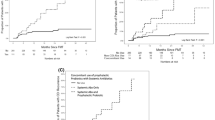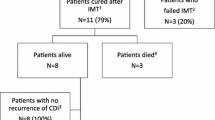Abstract
Clostridium difficile ribotype 027 (CD027)-associated diarrhea preferentially affects elderly patients and causes a high mortality rate. Fecal microbiota transplantation has become an alternative treatment for recurrent C. difficile infections. An outbreak of CD027 infections has occurred in Marseille since March 2013. From March to November 2013, we treated patients using only antibiotics or fecal microbiota transplantation after at least three relapses. Beginning in November 2013, we performed early transplantation using a nasogastric tube during the first week of infection, in combination with antibiotic treatment. Sixty-one patients with a mean age of 84 years were hospitalized, including 42 patients treated only with antibiotics, three with tardive transplantation, and 16 with early transplantation. The patients were comparable in clinical involvement. The global mortality rate was 3/16 (18.75 %) among the patients treated by early transplantation and 29/45 (64.4 %) among the patients only treated by antibiotics or by tardive transplantation (p < 0.01). Among these 45 patients, 23 (51 %) died at day 31, including 17 who died at day 7. Early fecal transplantation was associated with a significantly reduced mortality rate, with only one patient dead at day 31 (6.25 %). In a Cox model, early transplantation was the only independent predictor of survival (hazard ratio 0.18, 95 % confidence interval 0.05–0.61, p = 0.006). Six of the 16 patients (37.5 %) needed a second transplantation before symptom resolution. Early fecal microbiota transplantation in combination with antibiotics should be the first-line treatment for CD027 infections.


Similar content being viewed by others
References
Hurley BW, Nguyen CC (2002) The spectrum of pseudomembranous enterocolitis and antibiotic-associated diarrhea. Arch Intern Med 162(19):2177–2184
Birgand G, Blanckaert K, Carbonne A et al (2010) Investigation of a large outbreak of Clostridium difficile PCR-ribotype 027 infections in northern France, 2006–2007 and associated clusters in 2008–2009. Euro Surveill 15(25). pii: 19597
Lagier JC, Dubourg G, Cassir N et al (2013) Clostridium difficile 027 emerging outbreak in Marseille, France. Infect Control Hosp Epidemiol 34(12):1339–1341
Mascart G, Delmée M, Van Broeck J et al (2013) Impact of ribotype 027 on Clostridium difficile infection in a geriatric department. Eur J Clin Microbiol Infect Dis 32(9):1177–1182
Lim SK, Stuart RL, Mackin K et al (2014) Emergence of a ribotype 244 strain of Clostridium difficile associated with severe disease and related to the epidemic ribotype 027 strain. Clin Infect Dis 58(12):1723–1730
Gerding DN, Johnson S, Rupnik M et al (2014) Clostridium difficile binary toxin CDT: mechanism, epidemiology, and potential clinical importance. Gut Microbes 5(1):15–27
Loo VG, Poirier L, Miller MA et al (2005) A predominantly clonal multi-institutional outbreak of Clostridium difficile-associated diarrhea with high morbidity and mortality. N Engl J Med 353(23):2442–2449
Louie TJ, Miller MA, Mullane KM et al (2011) Fidaxomicin versus vancomycin for Clostridium difficile infection. N Engl J Med 364(5):422–431
van Nood E, Vrieze A, Nieuwdorp M et al (2013) Duodenal infusion of donor feces for recurrent Clostridium difficile. N Engl J Med 368(5):407–415
Brandt LJ, Aroniadis OC (2013) An overview of fecal microbiota transplantation: techniques, indications, and outcomes. Gastrointest Endosc 78(2):240–249
Gough E, Shaikh H, Manges AR (2011) Systematic review of intestinal microbiota transplantation (fecal bacteriotherapy) for recurrent Clostridium difficile infection. Clin Infect Dis 53(10):994–1002
Youngster I, Sauk J, Pindar C et al (2014) Fecal microbiota transplant for relapsing Clostridium difficile infection using a frozen inoculum from unrelated donors: a randomized, open-label, controlled pilot study. Clin Infect Dis 58(11):1515–1522
Lofgren ET, Moehring RW, Anderson DJ et al (2014) A mathematical model to evaluate the routine use of fecal microbiota transplantation to prevent incident and recurrent Clostridium difficile infection. Infect Control Hosp Epidemiol 35(1):18–27
Agito MD, Atreja A, Rizk MK (2013) Fecal microbiota transplantation for recurrent C difficile infection: ready for prime time? Cleve Clin J Med 80(2):101–108
Rao K, Young VB, Aronoff DM (2014) Fecal microbiota therapy: ready for prime time? Infect Control Hosp Epidemiol 35:28–29
Agence Nationale de Sécurité du Médicament et des Produits de Santé (ANSM) (2014) La transplantation de microbiote fécal et son encadrement dans les essais cliniques
Lagier JC (2014) Faecal microbiota transplantation: from practice to legislation before considering industrialization. Clin Microbiol Infect 20(11):1112–1118
Le Gall JR, Lemeshow S, Saulnier F (1993) A new Simplified Acute Physiology Score (SAPS II) based on a European/North American multicenter study. JAMA 270(24):2957–2963
Debast SB, Bauer MP, Kuijper EJ; European Society of Clinical Microbiology and Infectious Diseases (2014) European Society of Clinical Microbiology and Infectious Diseases: update of the treatment guidance document for Clostridium difficile infection. Clin Microbiol Infect 20(Suppl 2):1–26
Raoult D (2014) Faecal transplantation and infectious diseases practitioners. Clin Microbiol Infect 20(11):1097
Konijeti GG, Sauk J, Shrime MG et al (2014) Cost-effectiveness of competing strategies for management of recurrent Clostridium difficile infection: a decision analysis. Clin Infect Dis 58(11):1507–1514
Moore T, Rodriguez A, Bakken JS (2014) Fecal microbiota transplantation: a practical update for the infectious disease specialist. Clin Infect Dis 58(4):541–545
Youngster I, Russell GH, Pindar C et al (2014) Oral, capsulized, frozen fecal microbiota transplantation for relapsing Clostridium difficile infection. JAMA 312(17):1772–1778
Acknowledgments
This study was funded by IHU Méditerranée Infection.
Conflict of interest
The authors declare that they have no conflict of interest.
Compliance with ethical standards
The authors declare that they have complied with ethical standards with respect to the disclosure of conflict of interest and research involving humans according to French legislation. Informed consents were obtained (see the text for further details).
Author information
Authors and Affiliations
Corresponding author
Additional information
J.-C. Lagier and M. Delord contributed equally to this work.
Rights and permissions
About this article
Cite this article
Lagier, JC., Delord, M., Million, M. et al. Dramatic reduction in Clostridium difficile ribotype 027-associated mortality with early fecal transplantation by the nasogastric route: a preliminary report. Eur J Clin Microbiol Infect Dis 34, 1597–1601 (2015). https://doi.org/10.1007/s10096-015-2394-x
Received:
Accepted:
Published:
Issue Date:
DOI: https://doi.org/10.1007/s10096-015-2394-x




